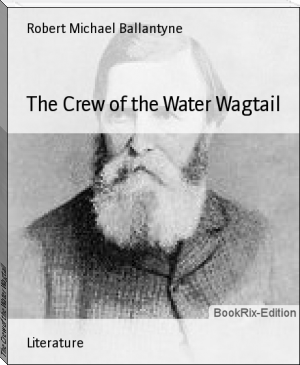The Crew of the Water Wagtail, Robert Michael Ballantyne [e reader pdf best TXT] 📗

- Author: Robert Michael Ballantyne
Book online «The Crew of the Water Wagtail, Robert Michael Ballantyne [e reader pdf best TXT] 📗». Author Robert Michael Ballantyne
"Ah, boys," he said, "ye don't onderstand the natur' o' the baste--see here."
Taking a piece of dried fish from his pocket, he went boldly forward and presented it. The dog snapped it greedily and gulped it down. Squill gave him another and another piece; as the fourth offering was presented he patted the animal quietly on its head. The victory was gained. The dog suffered them to bury its master, but for four days it refused to leave his grave. During that time Squill fed it regularly. Then he coaxed it to follow him, and at last it became, under the name of Blackboy, a general favourite, and a loving member of the community.
CHAPTER SEVENTEEN.
HAS REFERENCE TO FOOD AND A GREAT FIGHT.
There is always a certain amount of pleasure to be derived from the tracing of any subject of interest back to its origin. We have already seen how--like a noble river, which has its fountain-head in some mountain lakelet that would scarcely serve as a washing-basin for a Cyclops--the grand cod-fishing industry, which has enriched the world, and found employment for thousands of men for centuries, had its commencement in the crew of the _Water Wagtail_! we shall now show that another great industry, namely, the Newfoundland seal-fishery, had its origin in the same insignificant source.
King Grummidge was walking one morning along the shore of Wagtail Bay, with hands in pockets, hat on back of head, and that easy roll of gait so characteristic of nautical men and royalty. He was evidently troubled in mind, for a frown rested on his brow, and his lips were compressed. It might have been supposed that the cares of state were beginning to tell upon him, but such was not the case: food was the cause of his trouble.
"Fish, fish, fish," he growled, to Little Stubbs, who was his companion in the walk. "I'm sick tired o' fish. It's my opinion that if we go on eatin' fish like we've bin doin' since we was cast away here, we will turn into fish, or mermaids, if not somethin' worse. What are ye laughin' at?"
"At the notion o' you turnin' into a _maid_ of any sort," replied Stubbs.
"That's got nothin' to do wi' the argiment," returned Grummidge sternly, for his anxieties were too serious to permit of his indulging in levity at the time. "What we've got to do is to find meat, for them auks are nigh as dry as the fish. _Meat_, lad, meat, wi' plenty o' fat, that's the question o' the hour."
"Yes, it's _our_ question, no doubt," rejoined Stubbs.
He might as well have bestowed his bad pun on a rabbit, for Grummidge was essentially dense and sober-minded.
"But we've had a few rabbits of late, an' ducks an' partridges," he added.
"Rabbits! ducks! partridges!" repeated his companion, with contempt. "How many of them delicacies have we had? That's what I wants to know."
"Not many, I admit for there's none of us got much to boast of as shots."
"Shots!" echoed Grummidge. "You're right, Stubbs. Of all the blind bats and helpless boys with the bow, there's not I believe, in the whole world such a lot as the popilation of Wagtail Bay. Why, there's not two of ye who could hit the big shed at sixty paces, an' all the fresh meat as you've brought in yet has bin the result o' chance. Now look 'ee here, Stubbs, a notion has entered my head, an' when a notion does that, I usually grab that notion an' hold 'im a fast prisoner until I've made somethin' useful an' ship-shape of 'im. If it works properly we'll soon have somethin' better to eat than fish, an' more substantial than rabbits, ducks, partridges, or auks."
We may remark in passing that the animals which those wrecked sailors called rabbits were in reality hares. Moreover, the men took an easy, perhaps unscientific, method of classifying feathered game. Nearly everything with wings that dwelt chiefly on lake, river, or sea they called ducks, and all the feathered creatures of the forest they styled partridges. From this simple classification, however, were excepted swans, geese, eagles, and hawks.
"Well, Grummidge, what may be your notion?" asked Stubbs.
"My notion is--seals! For all our hard rowin' and wastin' of arrows we've failed to catch or kill a single seal, though there's such swarms of 'em all about. Now this is a great misfortin', for it's well known that seals make first-rate beef--leastwise to them as ain't partic'lar-- so we'll set about catchin' of 'em at once."
"But how?" asked Stubbs, becoming interested under the influence of his comrade's earnest enthusiasm.
"This is how. Look there, d'ye see that small island lyin' close to the shore with several seals' heads appearin' in the channel between?"
"Yes--what then?"
"Well, then, what I mean to do is to have nets made with big meshes, an' set 'em between that island an' the shore, and see what comes of it."
"But where's the twine to come from?" objected Stubbs.
"Twine! Ain't there no end o' cordage swashin' about the _Water Wagtail_ ever since she went ashore? An' haven't we got fingers? Can't we undo the strands an' make small cord? Surely some of ye have picked oakum enough to understand what that means!"
Stubbs was convinced. Moreover, the rest of the men were so convinced that the plan promised well, when it was explained to them, that they set to work with alacrity, and, in a brief space of time, made a strong net several fathoms in length, and with meshes large enough to permit of a seal's head squeezing through.
No sooner was it ready than the whole community went down to see it set. Then, with difficulty, they were prevented from waiting on the shore to watch the result. In the afternoon, when Grummidge gave permission, they ran down again with all the eagerness of children, and were rewarded by finding six fat seals entangled in the net and inflated almost to bursting with the water that had drowned them.
Thus they were supplied with "beef," and, what was of almost equal importance, with oil, which enabled them to fry the leanest food, besides affording them the means of making a steadier and stronger light than that of the log fires to which they had hitherto been accustomed.
It may be here remarked by captious readers, if such there be, that this cannot appropriately be styled the beginning of that grand sealing, or, as it is now styled, "swile huntin'," industry, which calls into action every year hundreds of steam and other vessels, and thousands of men, who slaughter hundreds of thousands of seals; which produces mints of money, and in the prosecutions of which men dare the terrible dangers of ice-drift and pack, in order that they may bludgeon the young seals upon the floes.
As well might it be objected that a tiny rivulet on the mountain-top is not the fountain-head of a mighty river, because its course is not marked by broad expanses and thundering cataracts. Grummidge's net was undoubtedly the beginning, the tiny rill, of the Newfoundland seal-fishery, and even the bludgeoning was initiated by one of his party. It happened thus:--
Big Swinton went out one morning to try his fortune with the bow and arrow in the neighbourhood of a range of cliffs that extended far away to the northward. Swinton usually chose to hunt in solitude. Having few sympathies with the crew he shut up his feelings within his own breast and brooded in silence on the revenge he was still resolved to take when a safe opportunity offered, for the man's nature was singularly resolute and, at the same time, unforgiving.
Now it chanced that Grummidge, in utter ignorance of where his foe had gone, took the same direction that morning, but started some time later, intending to explore the neighbourhood of the cliffs in search of sea-fowls' eggs.
On reaching the locality, Swinton found that a large ice-floe had come down from the Arctic regions, and stranded on the shore of the island. On the ice lay a black object which he rightly judged to be a seal. At first, he supposed it to be a dead one, but just as he was about to advance to examine it the animal raised its head and moved its tail. Love of the chase was powerful in Swinton's breast. He instantly crouched behind a boulder, and waited patiently till the seal again laid its head on the ice as if to continue its nap.
While the seaman crouched there, perfectly motionless, his brain was active. Arrows, he feared, would be of little use, even if he were capable of shooting well, which he was not. Other weapon he had none, with the exception of a clasp-knife. What was he to do? The only answer to that question was--try a club. But how was he to get at the seal with a club?
While pondering this question he observed that there was another seal on the same mass of ice, apparently sleeping, behind a hummock. He also noticed that both seals were separated from the water by a considerable breadth of ice--especially the one behind the hummock, and that there was a tongue of ice extending from the floe to the shore by which it seemed possible to reach the floe by patient stalking without disturbing the game. Instantly Swinton decided on a plan, and commenced by crawling into the bushes. There, with his clasp-knife, he carefully cut and peeled a club which even Hercules might have deigned to wield.
With this weapon he crawled on hands and knees slowly out to the floe, and soon discovered that the seals were much larger than he had at first supposed, and were probably a male and a female. Being ignorant of the nature of seals, and only acquainted with the fact that the tender nose of the animal is its most vulnerable part, he crept like a cat after a mouse towards the smaller seal, which he judged to be the female, until near enough to make a rush and cut off its retreat to the sea. He then closed with it, brought his great club down upon its snout, and laid it dead upon the ice. Turning quickly round, he observed, to his surprise, that the male seal instead of making for the water, as he had expected, was making towards himself in floundering and violent bounds!
It may be necessary here to state that there are several kinds of seals in the northern seas, and that the "hood seal"--or, as hunters call it the "dog-hood"--is among the largest and fiercest of them all. The male of this species is distinguished from the female by a singular hood, or fleshy bag, on his nose, which he has the power to inflate with air, so that it covers his eyes and face--thus forming a powerful protection to his sensitive nose, for, besides being elastic, the hood is uncommonly tough. It is said that this guard will even resist shot and that the only sure way of killing the dog-hood seal is to hit him on the neck at the base of the skull.
Besides possessing this safeguard, or natural buffer, the dog-hood is full of courage, which





Comments (0)